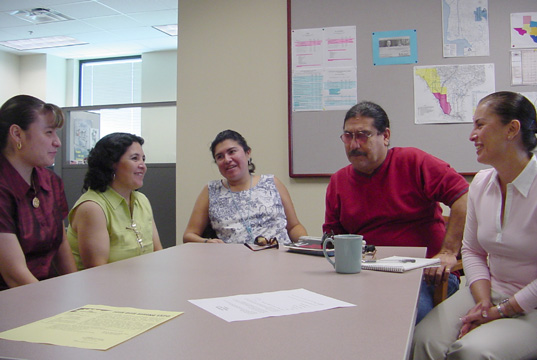TAMIU's Texas Center, Social Work Students Team Up on Colonia Research

A group of 10 social work students at Texas A&M International University learned the reality of working with people with needs this summer when they participated in a collaborative program aimed at assessing living conditions in colonias along U.S. Highway 59.
Students, all senior social work majors taking a research methods class, visited a total of 64 colonia homes and surveyed residents about their living conditions and the types of businesses they need in their communities.
The survey, part of a joint program between the Department of Psychology and Sociology, the Texas Center for Border Economics and Enterprise Development, and Centro Aztlán, a non-profit social services organization, took students to numerous settlements including Colorado Acres, Los Arcos, Los Fresnos, Las Lomas and Los Nopalitos.
Although survey results are still being compiled, students said they learned that some of the hypotheses they initially had about those communities were not accurate.
Sanjuanita De Luna, senior, for example, said she first imagined the majority of residents to be undocumented residents but that her survey showed otherwise.
"We were expecting to see a lot of illegal aliens," De Luna said, "But we found that there are as many U.S. citizens as illegal aliens living there," she said.
Reyna Martínez, senior, on the other hand, thought residents relied on someone in their community for first-aid needs.
"But a lot of them said that they'd rather travel to Laredo than to go to someone within their community," she said.
Dr. Marian Aguilar, associate professor of sociology, said students gained a valuable experience through the survey because they were able to work with a diverse population.
"What they learned went way beyond the conduct of that particular piece of research. They realized how useful it will be in the future," Dr. Aguilar said, "It exposed them to people with whom they may be working some day, and allowed them to decide if they want this as a profession. In social work, you will be working with people who have needs, with the poor, with all kinds of circumstances and environments. This was a perfect example."
Students wrote research papers based on their observations and survey results will be used by the Texas Center for reports on types of businesses and services colonia residents are lacking the most, said Patricia Canseco, project coordinator for the Texas Center.
Rosalía Guerrero, director of operations for Centro Aztlán, said the students' research will help entities working with colonias complete another part of the puzzle of the unknown colonia picture.
"The benefit of having students work with us is that they are able to collect information with no bias," Guerrero said, "We are still very ignorant about what is going on there (colonias).We are just guessing on who is living out there," Guerrero said.
Meanwhile, Rebecca Díaz, senior, who also works for the Women, Infants and Childen (WIC) Program, a federally-funded supplemental nutrition program, said participating in the research helped her appreciate her work better.
"Many of the clients I see in my agency are from colonias but I didn't exactly know their living conditions. Now I understand what they are going through," she said.

For further information, please contact Canseco at the Texas Center at 326-2846, e-mail pgcanseco@tamiu.edu or visit offices located in the Western Hemispheric Trade Center, room 221. University office hours are 8 a.m. - 5 p.m. Monday through Friday.
Journalists who need additional information or help with media requests and interviews should contact the Office of Public Affairs and Information Services at pais@tamiu.edu